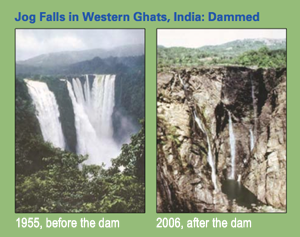Society, Culture, Religion and History
Taking action in India on downstream impact of dams - Report of the workshop held by International Rivers and Save Western Ghats Movement at Jog Falls, Karnataka in May 2011
Posted on 14 Jun, 2011 05:17 PM Jog falls in Western Ghats
Jog falls in Western Ghats
These dams have had a profound negative impact on communities and ecology upstream and downstream. While promised benefits of these dams (irrigation, hydro-power or flood control) have been overstated, numerous interrelated and complex negative impacts have simply not been studied or documented. Nonetheless, communities and ecosystems continue paying huge prices of these impacts.
Godavari river water sharing accord - A paper by N. Sasidhar
Posted on 13 Jun, 2011 03:37 PMThe water availability in these projects has diminished to 33% dependability from the designed dependability of 75% in last nine years. Due to meager inflows, the river water quality is becoming unsafe for human and cattle consumption. It also suggests the remedial action to overcome the problem in future.
Workshop for citizen journalists from central tribal region, CGNet, 20th - 25th June, 2011, New Delhi
Posted on 13 Jun, 2011 03:24 PMOrganizer: CGNet
Venue: Rajghat, New Delhi
Description:
CGNet is pleased to announce that Gandhi Smriti and Darshan Samiti, New Delhi has agreed to help organize a week long workshop for citizen journalists from Central Tribal India.
Accessing safe drinking water during floods in North Bihar
Posted on 13 Jun, 2011 03:23 PMThis season in the region is commonly referred to as – Barh (flood). For centuries local people have treated it as ‘a way of life’, and found ways to deal with it. Post independence, this ‘way of life’ gradually transformed into an assured annual devastation. The once self-sufficient communities in the flood plains have been relegated to being highly dependent on sources external to the village for their survival during floods.
‘Public spending and its effectiveness: Selected studies from Karnataka’ - One day seminar on health, education, water and local self-government, CBPS, 25th June, 2011, Bangalore
Posted on 13 Jun, 2011 02:09 PM Organizer: Centre for Budget and Policy Studies (CBPS)
Organizer: Centre for Budget and Policy Studies (CBPS)
Venue: White House, The Hotel Capitol, Raj bhavan Road, Bangalore
Topics:
- Health
- Education
- Drinking water
- Decentralisation
"Grassroots Comics: A Tool for Democracy" An exhibition of wall poster comics, World Comics India, 11th - 17th June, 2011, New Delhi
Posted on 10 Jun, 2011 03:02 PMContent courtesy: The Hindu
 Organizer: World Comics India
Organizer: World Comics India
Venue: Art Gallery (Annexe Building), India International Centre (IIC), 40 Max Muller Marg, Lodhi Estate, New Delhi
Reservoir fisheries of India - FAO technical paper (1995)
Posted on 08 Jun, 2011 05:49 PMThis desk review is directed at those engaged in research, education, development and planning and provides consolidated information on reservoirs, including the resources available, level of technologies and the extent of their utilisation and has attempted to systematically compile all relevant information on Indian reservoirs from a fisheries perspective.
Why Mumbai must reclaim its Mithi – A study by Observer Research Foundation
Posted on 08 Jun, 2011 05:05 PMThe river, along with its estuarine reach, provides the much-needed green lungs to the city in the form of mangroves. Neglect of this river was the main cause of the catastrophic floods in Mumbai on 26 July, 2005, which claimed nearly 1,000 lives. In what could be a monumental urban transformation initiative to be undertaken anywhere in India yet, ORF has proposed a grand vision for the reclamation of Mithi River. The study report and a documentary film ’Making the sewer a river again - Why Mumbai must reclaim its Mithi’ on the dreadful conditions of the river, was released in May, 2011 in Mumbai.
Tearing through the water landscape - Evaluating the environmental and social consequences of POSCO project in Odisha - A report by ESG
Posted on 08 Jun, 2011 03:34 PMBased on evidence from this inquiry, the study presents a critical analysis of the environmental and social impact information of POSCO's steel-power-port components to expose the fact that regulatory agencies have inadequate information on the short term and long term impacts of the project on the basis of the information that the company supplied to them. It also provides historical evidence





